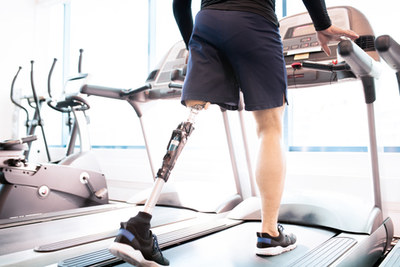 The real problem? The improved devices are expensive. Expensive claims reduce insurance companies’ profit margins. Failing to pay is a business strategy that can put good medicine beyond the reach of all but the very wealthy.
The real problem? The improved devices are expensive. Expensive claims reduce insurance companies’ profit margins. Failing to pay is a business strategy that can put good medicine beyond the reach of all but the very wealthy.How exactly do bionic feet work?
First of all, the technological improvements in prostheses are not limited to feet and ankles. These changes affect many patients who have lost arms, hands, legs, feet and parts thereof. It’s just that the feet and ankle folks are particularly numerous. Second, this is not new. Microprocessor assisted prostheses have been around for nearly twenty years. Finally, even those of us who are working with our birth feet but have had the misfortune to twist an ankle can appreciate how complex and subtle the functioning of that joint really is. Adding a bit of artificial intelligence means adding a lot.
A lower leg with a microprocessor does several things much better than a carbon steel blade foot, famous for running races or the sneaker on a stem with which even more people are familiar.
The microprocessor enhanced device responds to constant feedback from sensors to the microprocessor to change the resistance to the upward and downward motion of the foot based on walking speed, incline, decline and type of terrain. Adjustments made in real time improve stability, decrease the risk of falls and stumbles and lessen the discomfort often associated with a prosthetic. In addition, the “smart” technology reduces the amount of effort it takes to move an artificial limb. They are routinely prescribed for patients who can benefit from them.
Denied, denied, denied: Insurers denying improved prostheses
Nonetheless, insurers including Anthem routinely deny coverage for microprocessor improved prostheses, dismissing the devices as either not medically necessary or merely investigational.
According to Anthem’s internal guidelines, a device is not medically necessary if it is not appropriate for the treatment of a particular condition, especially in terms of “type, frequency, extent, site and duration” of a patient’s illness or injury. In addition, it must be the most appropriate treatment that can be safely provided, as determined by valid scientific evidence. The benefit to be gained should also outweigh any risk of harm to the patient’s health. The policy also favors treatments which are less invasive if the benefit to be derived is similar to that likely from a more invasive treatment.
A treatment is investigational if it has only been tried on human beings in limited settings, does not have governmental approval, does not improve patient outcomes or is not generally approved within the medical community.
Anthem, in particular, appears to evaluate medical necessity and investigational nature on the basis of whether a patient has a demonstrated need to walk very fast or for unusually long distances. These were never the reasons why microprocessor feet and ankle prostheses were prescribed in the first place. The goal was not to augment natural functioning; it was simply to get as close to it as possible, given the current state of biomechatronics, as the science is officially known.
How many people does this really affect?
Roughly two million Americans live with limb loss. Nearly 185,000 amputations happen every year. If that is too vague to visualize, think of it as five hundred amputations every single day. Some amputees choose to live without prostheses. The old fashioned ones were little more than a stump, and until recently, the improved ones could be difficult to learn to use. As advances continue, however, more and more people can be expected to turn to microprocessor- enhanced artificial limbs – if they can afford them.
READ MORE INSURANCE LEGAL NEWS
Until insurance companies cover the cost of “smart” prostheses, they will remain available only to the fortunate few. The solution may be some proactive legal work. Activist amputees are beginning to organize themselves around this issue. A proposed class action lawsuit against United Healthcare, for example, may include as many as 2,000 individuals. This is an issue that appears to be ripe for future development.
